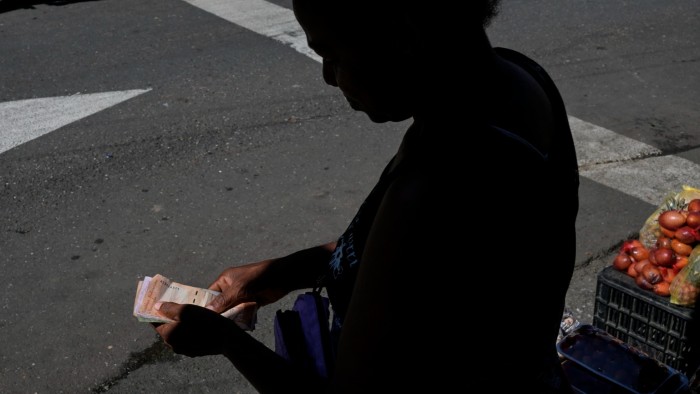Venezuela’s authoritarian government has arrested dozens of people, including a former finance minister, in a crackdown on black market dollars and independent economists that analysts fear could return the country to economic ruin.
The country’s bolívar currency has lost about two-thirds of its official value since President Nicolás Maduro abandoned a fixed exchange rate in October as dollar reserves needed to prop up the currency dwindled.
In an apparent attempt to halt the bolívar’s slide, the regime has charged at least 58 people with terrorism and other financial crimes for running websites that list black market exchange rates.
“The government doesn’t want to admit that it hasn’t got enough dollars to satisfy demand, and consequently, a parallel market with a much higher rate is inevitable,” said José Guerra, an economist at the Venezuelan Observatory of Finance (OVF) think-tank.
The government has also targeted people and organisations that criticise, or shed light on, its economic struggles — such as the OVF, whose data shows annual inflation surged from 51 per cent in October to 229 per cent in May.
At least two economists who have consulted with the OVF and former finance minister Rodrigo Cabezas were arrested this month, but they have not been charged and their whereabouts are unknown.

A powerful minister under Maduro’s predecessor and mentor Hugo Chávez, Cabezas turned against the regime in 2017 and has worked with the OVF.
“They say Rodrigo Cabezas has information about the financial people who operate the websites that are used to destabilise the dollar exchange rate,” interior minister Diosdado Cabello said on Wednesday.
Since October, Maduro has also launched aggressive audits on businesses and hiked taxes on them.
Analysts say these moves could erase the gains achieved in recent years through tacit dollarisation and loosening economic restrictions. The result could be a return to the runaway hyperinflation and widespread misery experienced in 2016, they say.
“What could lead us to a scenario like that of 2016-2017 is what these first five months of the year have seen in the management of economic policy,” said Aarón Olmos, a professor of economics at the Central University of Venezuela.
Maduro — who was sworn in for a third term in January after claiming victory in an election widely regarded as a sham — lost a key economic lifeline last month when oil major Chevron’s licence to work in the country expired on the Trump administration’s orders.
Exemption licences were worth about $4.5bn to Maduro’s government last year, analysts say, with Chevron alone putting about $200mn a month into the exchange market.
Washington has been hardening its stance on Maduro, who clamped down on dissent after his disputed election victory last year. His government said it arrested hundreds of people who protested the result.
With dollars drying up after heavy spending for the election, the government-controlled central bank then ditched the fixed exchange rate that had helped the country stabilise its finances. Instead, it “opted for a system of mini-devaluations”, José Guerra said, but those have not kept pace with the black market rate.
The official exchange rate was listed at 104.5 bolívars to the dollar on Friday, about triple its price when the central bank stopped defending the currency — and about 10 per cent less than Friday’s black market rate of 115.4, according to one monitor.
Around the time it changed currency policy, the central bank also stopped releasing official inflation numbers — making organisations such as OVF, which publishes such data, an irritant.
“Measuring prices is not a crime, it is a necessity in Caracas,” the OVF said on Monday. “The OVF is not responsible for the drafting and application of economic policy that causes a rise in prices.”
More than 50 websites tracking the parallel rate have been shut down in the last month, according to Ve Sin Filtro, an internet rights watchdog.
Bárbara Bitriago, 19, was on her way to work in a shopping centre in the Venezuelan city of Maracay earlier this month when authorities arrested her and charged her with terrorism and financial crimes for allegedly being involved with one of those websites.
“She has nothing to do with what she’s accused of,” said her mother, Joselín Rodríguez. “My daughter is innocent.”
Years of hyperinflation and price controls led Venezuelans to use the greenback as their preferred currency, with prices in shops listed in dollars, while US banknotes circulated throughout the country.
Rosa, a public sector worker who earns 130 bolívars ($1.26) a month, said the government’s crackdown was unlikely to yield results — and will only punish people like her.
“Whether there’s dollar speculation or not, we workers are the most affected because the government isn’t improving the economy,” said Rosa, who gave a pseudonym to protect her identity. “If they jail people, that won’t solve anything — I’ll still earn 130 bolívars and the dollar will keep rising.”
https://www.ft.com/content/5ccbe808-dd4d-440c-bf85-50fe4ad2be92


